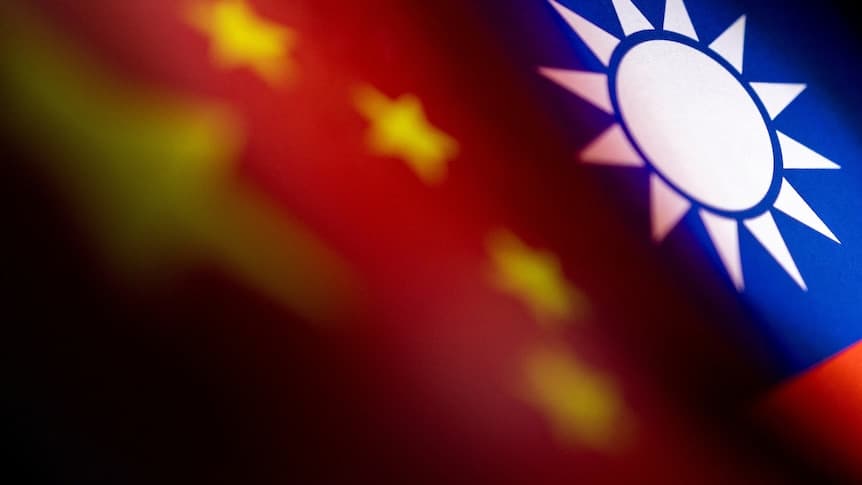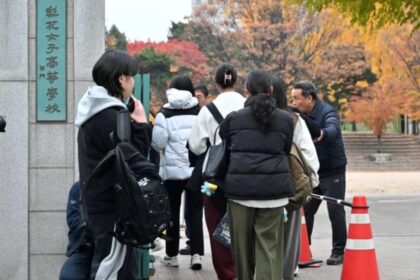A new front in the cross strait information fight
Police in Quanzhou, Fujian province, have posted cash rewards for tips that lead to the detention of Taiwanese influencers Wen Tzu yu and Chen Po yuan. The notice lists rewards between 50,000 and 250,000 yuan, roughly 7,000 to 35,000 US dollars, and accuses the pair of spreading anti China content, acting as enforcers and accomplices of Taiwan independence, and causing a very negative impact. The move places two prominent online creators inside a widening confrontation over speech and sovereignty that stretches far beyond the Strait.
- A new front in the cross strait information fight
- Who are Wen Tzu yu and Chen Po yuan
- What Beijing alleges and how Chinese law applies
- Taipeis reply and the limits of jurisdiction
- Inside the documentary that touched a nerve
- What the two creators say
- A growing pattern of extraterritorial pressure
- Could arrests happen abroad
- Why influencers are in the crosshairs
- The Bottom Line
Authorities did not list specific posts in the public notice. The immediate backdrop is a two part documentary that Wen uploaded in December, featuring Chen, which examined how mainland agencies and intermediaries court popular Taiwanese creators to promote unification. The videos described all expenses paid trips and curated itineraries for influencers with large followings. They drew millions of views and ignited debate in Taiwan about the reach and tactics of influence campaigns.
Beijing regards Taiwan as part of the Peoples Republic of China and has not ruled out using force to bring the island under its control. Taiwan rejects that claim. Officials in Taipei call the reward notice a show move, saying Chinese police lack any power inside Taiwan and arguing the notice is designed to intimidate and divide.
The case highlights a volatile mix of law, politics, and digital culture, where short videos and music cross borders in seconds. Police language about secessionist crimes now targets creators whose audiences live largely on YouTube, Instagram, Threads, and TikTok. The clash between Chinese criminal charges and Taiwanese free speech protections sits at the heart of the dispute.
Who are Wen Tzu yu and Chen Po yuan
Wen, known online as Pa Chiung, is a Taiwanese video producer whose channel blends political commentary with investigative work. Chen, a rapper who performs as Minnan Wolf, mixes music and pointed online commentary about China and cross strait politics. Over the past year, the two collaborated on a project to document how Taiwanese creators are approached to take part in pro unification messaging on mainland platforms.
In the films released in December, the pair said they visited the mainland and posed as pro Chinese influencers to observe the pitch. They recorded conversations about sponsored travel, organized meetings, and sample talking points that would frame unification in a favorable light. The films circulated widely in Taiwan, where skepticism toward official messaging from Beijing is common, especially among younger audiences who consume politics through creators rather than traditional outlets.
The Quanzhou notice names both men and lists their online aliases. It signals a willingness by mainland police to bring criminal accusations against non residents for speech produced outside the PRC. While the notice carries no force inside Taiwan, it can shadow creators who plan to travel to third countries, and it is intended to deter others from producing similar content.
What Beijing alleges and how Chinese law applies
The Quanzhou Public Security Bureau accuses Wen and Chen of splitting the country and inciting national division. Officials say the pair attacked policies that Beijing describes as benefiting people from Taiwan and targeted mainland spouses who live on the island. The notice offers tiered rewards for valuable tips that support an arrest or disruption.
In its statement, Quanzhou city police characterized the videos and posts as behavior that undermines policies meant to attract Taiwanese residents.
“The social media creators had viciously attacked and smeared the mainlands preferential policies toward Taiwan.”
Chen Binhua, spokesman for the Taiwan Affairs Office of the State Council, amplified the accusation during a briefing, saying the pair pushed separatist ideas and urged resistance.
“The two suspects have repeatedly published and spread rhetoric advocating for resisting the Chinese mainland to protect Taiwan and relying on the United States for independence, inciting national division.”
Chinese criminal law includes offenses for secession and inciting others to split the country. The Anti Secession Law, national security provisions, and related regulations give police and prosecutors broad latitude to pursue cases they classify as separatist, including online expression. Cities and provinces frequently publish reward notices to gather tips, and the Quanzhou notice sets a ceiling of 250,000 yuan for information that leads to capture.
Authorities have paired these actions with a wider campaign against what they describe as disinformation and ideological subversion. In October, police in Xiamen, also in Fujian, issued a bounty for tips on 18 people alleged to be part of a Taiwanese military psychological operations unit. State media describe these cases as lawful responses to security threats and encourage people on both sides of the Strait to provide information.
Taipeis reply and the limits of jurisdiction
Taiwans Mainland Affairs Council dismissed the notice. Deputy minister Liang Wen chieh said the accusations are political speech in the eyes of Beijing and that evidence is not required for such charges under the PRC system.
“Everyone knows that the accusation against them is basically that they are advocating Taiwan independence, and basically, for the CCP, this kind of charge does not require evidence at all. The reward is merely for show, and it also serves to create division and conflict within Taiwanese society.”
Officials in Taipei argue that PRC criminal law does not apply in Taiwan and that free speech protections cover harsh criticism of Beijing. Government spokespeople say Taiwan will continue to uphold lawful expression and work with partners to counter foreign interference. They warn that any attempt to enforce mainland notices in Taiwan would violate local law.
Extradition is unlikely. Taiwan has no arrangement with the PRC for surrendering suspects. Many countries that do have treaties with China apply a double criminality test and exclude political offenses, which often shields speech that is protected under local law. Interpol notices are not international arrest warrants and are subject to national review before any action is taken.
Taiwanese law can penalize citizens who help foreign authorities deprive the rights and freedoms of other Taiwanese. Legal scholars on the island describe bounty notices as tools of psychological and legal warfare that test the resolve of government and society while attempting to chill public debate.
Inside the documentary that touched a nerve
Wens two part film centered on what Chinese agencies present as preferential policies for people from Taiwan. These include scholarships, work permits, and guided tours with curated meetings. The videos alleged that in exchange for hospitality and access, creators are encouraged to produce content that praises cross strait ties, avoids sensitive topics, and nudges audiences toward support for unification.
The United Front Work Department (UFWD), a Communist Party system that builds alliances and shapes perceptions, features prominently in outreach to non Communist voices. The film portrayed intermediaries who approach creators with offers of accelerated growth on mainland platforms and brand deals. Chinese police later characterized the films as smears that turned goodwill into attacks, while many viewers in Taiwan saw them as exposure of soft power tactics.
What the two creators say
Both men have brushed off the threats. Chen, who raps under the name Minnan Wolf, posted a statement that underscored his refusal to back down.
“I stand up for myself. The greater the wind, the more stable I am.”
Wen, known as Pa Chiung online, reacted with irony, saying he discovered the notice after waking up and likened his case to a lawmaker also targeted by Beijing.
“So it seems I have become Puma Shen.”
Chen also visited a police station in Taichung to report online threats referencing the bounty. He later joked that he tried to surrender at the station, only to be told that local police could not arrest him for a mainland case, a point he framed as a civics lesson for commentors who equate Taiwan with the PRC.
A growing pattern of extraterritorial pressure
The Wen and Chen case fits a broader pattern. Beijing has announced an investigation into Puma Shen, a prominent legislator in Taiwan, under similar allegations related to separatism. Police have also issued notices that name alleged members of a Taiwanese psychological operations unit and accuse them of disinformation, intelligence gathering, and mobilization.
Official media argue that cross border apprehension can proceed through Interpol channels and bilateral treaties. Legal practitioners and rights advocates counter that outside the PRC, such cases seldom pass judicial review when they focus on expression rather than violence or espionage. The practical effect lands inside Taiwan and among the diaspora, where notices can chill speech, invite online harassment, and test social cohesion.
For many in Taiwan, the response is defiance. Civic groups, artists, and lawmakers describe the bounties as pressure that strengthens the case for protecting local speech. That posture is rooted in Taiwans modern political life, where open debate and criticism of all sides are core features of public culture.
Could arrests happen abroad
If Wen or Chen travel to third countries, exposure depends on those states laws and their judicial standards. Some countries honor PRC requests when the alleged conduct is also a crime locally and when courts are convinced the case is not political. Many others decline, especially when the request centers on speech that is legal in their own system.
Travel to places without strong procedural safeguards, or where political offense exceptions are weak, carries more risk. Even then, authorities usually must document conduct that meets local thresholds. For now, the notice serves as a warning about overseas travel and a signal to other outspoken creators that the mainland is willing to pursue cases built on online expression.
Why influencers are in the crosshairs
Influencers shape what younger audiences see and share. Shorts, rap verses, and reaction videos can make complex political ideas feel personal. Governments everywhere try to recruit or neutralize creators when the topic is sensitive. In cross strait relations, posts about identity, security, and the future of Taiwan carry special weight, so creators become targets for outreach and for punishment.
Beijing labels online campaigns that defend Taiwans autonomy as separatist propaganda. Taipei sees many of the same posts as protected speech. Both sides use programs, subsidies, and platform policies to tilt the conversation. The Wen and Chen case shows how an online investigation can cascade into legal threats, with the audience watching in real time.
The Bottom Line
- Quanzhou police offered 50,000 to 250,000 yuan for tips on Taiwanese creators Wen Tzu yu and Chen Po yuan, citing separatism and incitement claims.
- The notice followed a widely viewed documentary that probed how agencies court influencers to promote unification.
- Mainland statements accuse the pair of smearing preferential policies and urging resistance to the PRC.
- Taiwans Mainland Affairs Council says the reward is a show move with no legal force in Taiwan and aims to divide society.
- Both creators dismissed the threats; Chen reported online harassment to local police in Taichung.
- Beijing has also targeted lawmaker Puma Shen and alleged members of a psychological operations unit in earlier notices.
- Extradition from Taiwan is impossible, and many countries reject requests that hinge on political speech.
- The case underscores how online influence, legal tools, and cross strait rivalry now intersect in the social media era.












